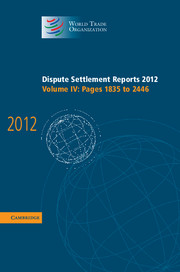Book contents
- Frontmatter
- Table of Contents
- United States - Measures Concerning the Importation, Marketing and Sale of Tuna and Tuna Products (WT/DS381)
- Table of Contents
- CASES CITED IN THIS REPORT
- ABBREVIATIONS USED IN THIS REPORT
- I INTRODUCTION
- II ARGUMENTS OF THE PARTICIPANTS AND THE THIRD PARTICIPANTS
- III ISSUES RAISED ON APPEAL
- IV BACKGROUND AND OVERVIEW OF THE MEASURE AT ISSUE
- V LEGAL CHARACTERIZATION OF THE MEASURE AT ISSUE
- VI ARTICLE 2.1 OF THE TBT AGREEMENT
- VII ARTICLE 2.2 OF THE TBT AGREEMENT
- VIII ARTICLE 2.4 OF THE TBT AGREEMENT
- IX MEXICO'S CLAIMS UNDER ARTICLES I:1 AND III:4 OF THE GATT 1994
- X FINDINGS AND CONCLUSIONS
- ANNEX I Notification of an Appeal by the United States, WT/DS381/10
- ANNEX II Notification of an Other Appeal by Mexico, WT/DS381/11
- Table of Contents
- TABLE OF WTO DISPUTES CITED IN THIS REPORT
- TABLE OF GATT DISPUTES CITED IN THIS REPORT
- LIST OF ABBREVIATIONS
- LIST OF US EXHIBITS CITED IN THIS REPORT
- LIST OF MEXICAN EXHIBITS CITED IN THIS REPORT
- LIST OF AMICUS CURIAE EXHIBITS CITED IN THIS REPORT
- I INTRODUCTION
- II FACTUAL ASPECTS
- III PARTIES' REQUESTS FOR FINDINGS AND RECOMMENDATIONS
- IV ARGUMENTS OF THE PARTIES
- V ARGUMENTS OF THE THIRD PARTIES
- VI INTERIM REVIEW
- VII FINDINGS
- VIII RULINGS AND RECOMMENDATIONS
- Cumulative List of Published Disputes
VI - ARTICLE 2.1 OF THE TBT AGREEMENT
Published online by Cambridge University Press: 13 December 2017
- Frontmatter
- Table of Contents
- United States - Measures Concerning the Importation, Marketing and Sale of Tuna and Tuna Products (WT/DS381)
- Table of Contents
- CASES CITED IN THIS REPORT
- ABBREVIATIONS USED IN THIS REPORT
- I INTRODUCTION
- II ARGUMENTS OF THE PARTICIPANTS AND THE THIRD PARTICIPANTS
- III ISSUES RAISED ON APPEAL
- IV BACKGROUND AND OVERVIEW OF THE MEASURE AT ISSUE
- V LEGAL CHARACTERIZATION OF THE MEASURE AT ISSUE
- VI ARTICLE 2.1 OF THE TBT AGREEMENT
- VII ARTICLE 2.2 OF THE TBT AGREEMENT
- VIII ARTICLE 2.4 OF THE TBT AGREEMENT
- IX MEXICO'S CLAIMS UNDER ARTICLES I:1 AND III:4 OF THE GATT 1994
- X FINDINGS AND CONCLUSIONS
- ANNEX I Notification of an Appeal by the United States, WT/DS381/10
- ANNEX II Notification of an Other Appeal by Mexico, WT/DS381/11
- Table of Contents
- TABLE OF WTO DISPUTES CITED IN THIS REPORT
- TABLE OF GATT DISPUTES CITED IN THIS REPORT
- LIST OF ABBREVIATIONS
- LIST OF US EXHIBITS CITED IN THIS REPORT
- LIST OF MEXICAN EXHIBITS CITED IN THIS REPORT
- LIST OF AMICUS CURIAE EXHIBITS CITED IN THIS REPORT
- I INTRODUCTION
- II FACTUAL ASPECTS
- III PARTIES' REQUESTS FOR FINDINGS AND RECOMMENDATIONS
- IV ARGUMENTS OF THE PARTIES
- V ARGUMENTS OF THE THIRD PARTIES
- VI INTERIM REVIEW
- VII FINDINGS
- VIII RULINGS AND RECOMMENDATIONS
- Cumulative List of Published Disputes
Summary
200. We turn next to address Mexico's appeal of the Panel's finding that Mexico failed to demonstrate that the US “dolphin-safe” labelling provisions are inconsistent with Article 2.1 of the TBT Agreement.
201. Article 2.1 of the TBT Agreement provides that, with respect to their central government bodies:
Members shall ensure that in respect of technical regulations, products imported from the territory of any Member shall be accorded treatment no less favourable than that accorded to like products of national origin and to like products originating in any other country.
202. Article 2.1 of the TBT Agreement consists of three elements that must be demonstrated in order to establish an inconsistency with this provision, namely: (i) that the measure at issue constitutes a “technical regulation” within the meaning of Annex 1.1; (ii) that the imported products must be like the domestic product and the products of other origins; and (iii) that the treatment accorded to imported products must be less favourable than that accorded to like domestic products and like products from other countries. Mexico's appeal concerns only the Panel's finding in respect of the third element, namely, the “treatment no less favourable” standard in Article 2.1. We further note that the United States has not appealed the Panel's finding that Mexican tuna products are “like” tuna products of United States' origin and tuna products originating in any other country within the meaning of Article 2.1 of the TBT Agreement.
- Type
- Chapter
- Information
- Dispute Settlement Reports 2012 , pp. 1929 - 1966Publisher: Cambridge University PressPrint publication year: 2014
- 2
- Cited by



